反意疑问句与感叹句
- 格式:doc
- 大小:39.50 KB
- 文档页数:7
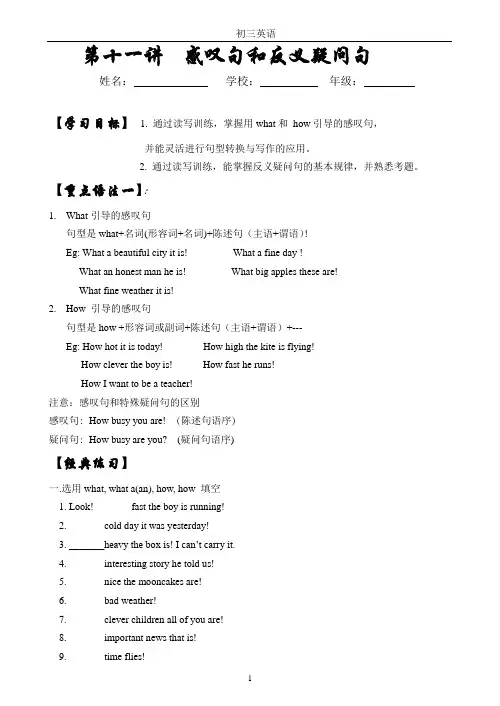
第十一讲感叹句和反义疑问句姓名:学校:年级:【学习目标】1. 通过读写训练,掌握用what和how引导的感叹句,并能灵活进行句型转换与写作的应用。
2. 通过读写训练,能掌握反义疑问句的基本规律,并熟悉考题。
【重点语法一】:1.What引导的感叹句句型是what+名词(形容词+名词)+陈述句(主语+谓语)!Eg: What a beautiful city it is! What a fine day !What an honest man he is! What big apples these are!What fine weather it is!2.How 引导的感叹句句型是how +形容词或副词+陈述句(主语+谓语)+---Eg: How hot it is today! How high the kite is flying!How clever the boy is! How fast he runs!How I want to be a teacher!注意:感叹句和特殊疑问句的区别感叹句:How busy you are! (陈述句语序)疑问句:How busy are you? (疑问句语序)【经典练习】一.选用what, what a(an), how, how 填空1. Look! _______fast the boy is running!2. _______cold day it was yesterday!3. _______heavy the box is! I can’t carry it.4. _______interesting story he told us!5. _______nice the mooncakes are!6. _______bad weather!7. _______clever children all of you are!8. _______important news that is!9. _______time flies!10. _______beautiful flowers you bought me!感叹句练习一. 将下列句子改为感叹句.It’s very cold today. _______________________________________It’s a nice dress. __________________________________________Those are lovely animals. __________________________________The man drives very carefully. ______________________________It’s bad weather. __________________________________________We have a very happy family. _______________________________Mrs. Li found her handbag luckily. _____________________________The plane flies quite quickly.__________________________________She is a very careful student.__________________________________This is an easy problem._____________________________________二.用What , What a , What an , How 填空.1._____________ hot the weather is !2._____________hard her father works !3._____________long way it is from Guangdong to Paris !4._____________fine day it was yesterday !5._____________beautiful your voice is !6._____________interesting picture-books !7._____________lovely baby !8._____________strong wind !9._____________ sad news he told us !10._____________happy she was last weekend !我的选择我做主1.The young man came riding full speed down the road on his bicycle. _____it was!A. how dangerous the sceneB. What dangerous a sceneC. How a dangerous sceneD. What a dangerous scene2. __________wonderful movie! We like it very much.A. WhatB. What aC. HowD. How a3. ---_________good news it is! The pndas are found alive after the earthquake.---It’s so _____________What a; exited B. What; exciting C. How a; excited D. How; exciting4.---Tan Qianqiu, a politics teacher, died in order to save his four students in the earthquake inWenchuan.---________teacher he is!How excellent B. What an excellent C. What a excellent D. How an excellent5.________sunny day it is! It’s really good to go out for a skiing.A. What aB. WhatC. How aD. How6. ---Spider—man III will be on in our city.---_________big news! I can’t wait to se e it.A. What aB. HowC. WhatD. How a7. ---I hear that an old couple are traveling around China by bike.---Oh, _________long way on their bicycles! They are so great.A. What aB. HowC. WhatD. how a8. ---Miss Sun, what are we going to do next?---Let’s go out for doing sports. _________sunny day!A. WhatB. What aC. HowD. How a9. ---___________it was yesterday because of the storm!A. What bad weatherB. What a bad weatherC. How bad a weatherD. How bad weather10. ---__________kind girl Nancy is!---Yes, she is always ready to help others.A. WhatB. What aC. HowD. How【知识要点二】:一、反意疑问句中问句部分的动词与陈述部分的动词在语气上成相反的对应关系,即:肯定+否定?否定+肯定?如:①You can't do it, can you? ②They are very late for the meeting, aren't they?二、反意疑问句中问句部分的动词与陈述部分的动词种类要对应一致。
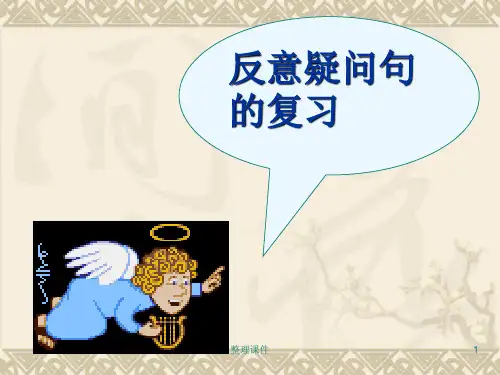
![[转载] 反义疑问句和感叹句专题练习](https://uimg.taocdn.com/36adbfd126fff705cc170a8a.webp)
反义疑问句和感叹句专题练习一.反义疑问句:1. 构成此句型的词有: am, is , are, was, were, do , does, did, havehas, can, could, must, will , would, 等等。
2. 如果前半句是肯定, 反义疑问句用否定形式.如果前半句是否定, 反义疑问句用肯定形式.3. 如果前半句中有以下词时: never, hardly, few, little, nobody, noone, nothing, 后半句用肯定形式.4. 祈使句的反义疑问句,用will you以let us开头的,反义疑问句用will you以let’s 开头的,反义疑问句用shall we5.主语是this, that时,反义疑问句的主语用it,主语是these, those是,反义疑问句的主语用they,6. there be结构中,反义疑问句的主语用thereEX I : Complete the tag questions.1.We are going to work on the farm next week , __________________?2.Mrs. Green is a teacher of English in Shanghai, _________________?3.It was very cold yesterday, _________________?4.He often goes to work by bus, ________________?5.The old men usually do sports in the morning in the park,________________?6.Uncle Wand can make different kinds of kites, _________________?7.Peter was late for school this morning, ____________________?8.My sister would like a purple coat, ___________________?9.Mr. Li had an important meeting last week, __________________?10.They were at home last night, ___________________?11.Your My father cooks on Sundays, __________________?12.You like American food a lot , ____________________?13.It often snows in winter in north China , ____________________?14.We should help each other, _____________________?15.Lucy and Lily live in China with their parents, __________________?16.The man will visit Xi’an next month, _________________?17.Her pen-friend wrote to her the day before yesterday, ________________? 18.The teacher is talking to a boy over there, ____________________?19.Monkeys like to eat bananas, _____________________?20.His aunt bought a new car, __________________?EX II: Complete the tag questions.1.You aren’t in this school ,___________________?2.They don’t study science at school, __________________?3.It isn’t Monday today, _______________?4.The old man can’t look after himself, ______________?5.Your mother doesn’t teach maths, _______________?6.Miss Gao won’t leave tonight, _______________?7.I’m not in Row Three, __________________?8.The singer didn’t gi ve a concert in 2000, ______________?9.They weren’t in Guangzhou last week, _______________?10.Jim couldn’t swim at the age of five, _________________?EX III: Complete the tag questions.1.That is an interesting film , _______________?e to the front, ________________?3.There is nothing in the box, ________________?4.Let’s go boating next week, __________________?5.These are apple trees, ___________________?6.You never read his books, ________________?7.There was a concert in the theatre last night, _______________?8.Let us go to the farm together, _________________?9.The boy is no longer a waiter in the hotel , ________________?10.Please answer my questions, __________________?11.There was nobody in the house, ________________?12.His mother never goes to Tibet, _________________?13.This is very interesting, _________________?14.He found nobody around the farm, ___________________?15.Let’s go on a field trip, ________________?16.There are some children playing at the zoo, __________________?17.Mr. Yang knew few Chinese when he was in USA, ______________?18.There was little meat in the fridge, ___________________?19.Let me have a look, ___________________?20.They had no time to do the work, ________________?感叹句结构:What + (a/an) + 形容词+ 名词+ (主语+谓语)..!How + 形容词/ 副词+ ( 主语+ 谓语) !EG:What great books these are !What an exciting match we saw !How deep the well is !How beautifully the girl sings !Ex I : 将下列句子改为感叹句.1.It’s very cold today.2.It’s a nice dress.3.Those are lovely animals.4.The man drives very carefully.5.It’s bad weather.6.He cooks very delicious food.7.They had a good time last Sunday.8.The girl comes to school so early.9.He told me important news.10.We have a very happy family.11.Mrs. Li found her handbag luckily.12.The plane flies quite quickly.13.She is a very careful student.14.This is an easy problem.15.Your mother looks very young.16.The music sounds nice.17.That is hard work.18.Her son is very naughty.19.He has a useful dictionary.20.Li Ping jumps very high. Ex II. 将下列句子翻译成英语.1.这件毛衣真好看!2.那些钢笔太贵了!3.多好的一本书啊!4.这张相片多么有趣啊!5.他是位多么善良的人啊!6.春天多么暖和啊!7.这是一部多么激动人心的电影啊!8.这些问题真难!9.多可爱的礼物啊!10.那个老太太走路真慢!Ex III. 用What , What a , What an , How 填空.1._____________ hot the weather is !2._____________hard her father works !3._____________long way it is from Guangdong to Paris !4._____________fine day it was yesterday !5._____________beautiful your voice is !6._____________interesting picture-books !7._____________lovely baby !8._____________strong wind !9._____________ sad new he told us !10._____________happy she was last weekend !11._____________good weather ! Why not go out for a walk !12._____________nice the garden is !13._____________difficult work he did !14._____________broken the house looks !15._____________ happy life we have !16._____________well my deskmate swims !17._____________helpful girl she is !18._____________delicious mooncakes !19._____________dangerous the tigers are !20._____________tired you look !。
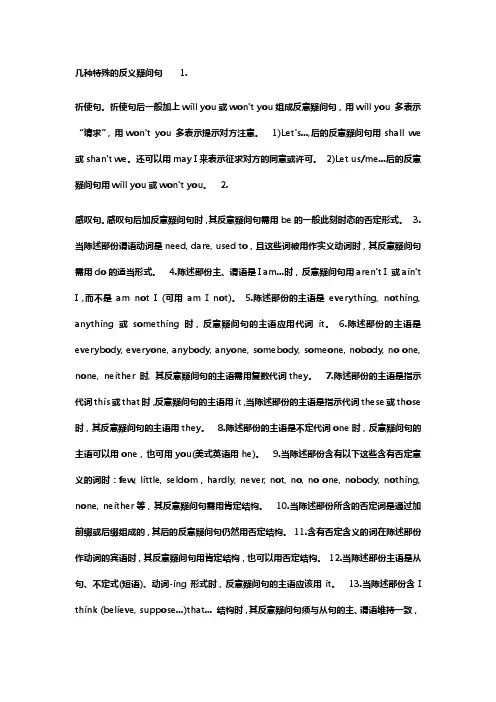
几种特殊的反义疑问句 1.祈使句。
祈使句后一般加上will you或won't you组成反意疑问句,用will you 多表示“请求”,用won't you 多表示提示对方注意。
1)Let's...,后的反意疑问句用shall we 或shan't we。
还可以用may I来表示征求对方的同意或许可。
2)Let us/me...后的反意疑问句用will you或won't you。
2.感叹句。
感叹句后加反意疑问句时,其反意疑问句需用be的一般此刻时态的否定形式。
3. 当陈述部份谓语动词是need, dare, used to,且这些词被用作实义动词时,其反意疑问句需用do的适当形式。
4.陈述部份主、谓语是I am...时,反意疑问句用aren't I 或ain't I ,而不是am not I (可用am I not)。
5.陈述部份的主语是everything, nothing, anything或something 时,反意疑问句的主语应用代词it。
6.陈述部份的主语是everybody, everyone, anybody, anyone, somebody, someone, nobody, no one, none, neither 时, 其反意疑问句的主语需用复数代词they。
7.陈述部份的主语是指示代词this或that时,反意疑问句的主语用it,当陈述部份的主语是指示代词these或those 时,其反意疑问句的主语用they。
8.陈述部份的主语是不定代词one时,反意疑问句的主语可以用one,也可用you(美式英语用he)。
9.当陈述部份含有以下这些含有否定意义的词时:few, little, seldom,hardly, never, not, no, no one, nobody, nothing, none, neither等,其反意疑问句需用肯定结构。
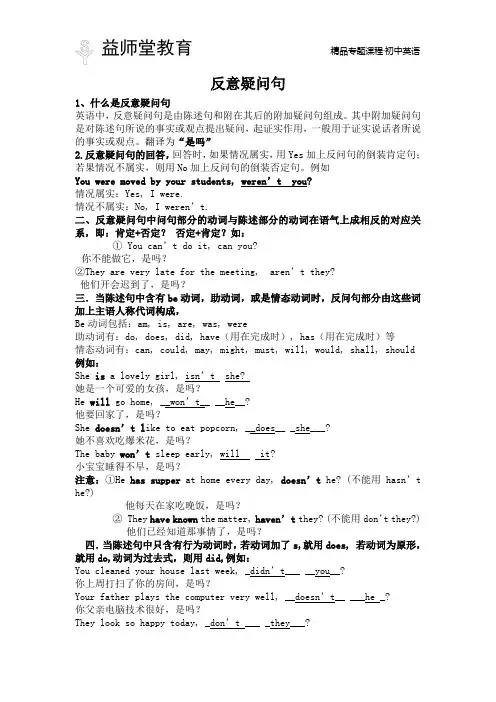
反意疑问句1、什么是反意疑问句英语中,反意疑问句是由陈述句和附在其后的附加疑问句组成。
其中附加疑问句是对陈述句所说的事实或观点提出疑问,起证实作用,一般用于证实说话者所说的事实或观点。
翻译为“是吗”2.反意疑问句的回答,回答时,如果情况属实,用Yes加上反问句的倒装肯定句;若果情况不属实,则用No加上反问句的倒装否定句。
例如You were moved by your students, weren’t you?情况属实:Yes, I were.情况不属实:No, I weren’t.二、反意疑问句中问句部分的动词与陈述部分的动词在语气上成相反的对应关系,即:肯定+否定?否定+肯定?如:①You can’t do it, can you?你不能做它,是吗?②They are very late for the meeting, aren’t they?他们开会迟到了,是吗?三.当陈述句中含有be动词,助动词,或是情态动词时,反问句部分由这些词加上主语人称代词构成,Be动词包括:am, is, are, was, were助动词有:do, does, did, have(用在完成时), has(用在完成时)等情态动词有:can, could, may, might, must, will, would, shall, should 例如:She is a lovely girl, isn’t she?她是一个可爱的女孩,是吗?He will go home, __won’t__ __he__?他要回家了,是吗?She doesn’t l ike to eat popcorn, __does__ _she___?她不喜欢吃爆米花,是吗?The baby won’t sleep early, will it?小宝宝睡得不早,是吗?注意:①He has supper at home every day,doesn’t he? (不能用hasn’t he?)他每天在家吃晚饭,是吗?②They have known the matter, haven’t they? (不能用don’t they?)他们已经知道那事情了,是吗?四.当陈述句中只含有行为动词时,若动词加了s,就用does, 若动词为原形,就用do,动词为过去式,则用did,例如:You cleaned your house last week, _didn’t___ __you__?你上周打扫了你的房间,是吗?Your father plays the computer very well, __doesn’t__ ___he _?你父亲电脑技术很好,是吗?They look so happy today, _don’t ___ _they___?你今天看起来很高兴,是吗?五.反意疑问句的陈述部分带有little, few, never, hardly, seldom,nobody, nothing, barely, scarcely等否定意义的词时,问句部分用肯定式。
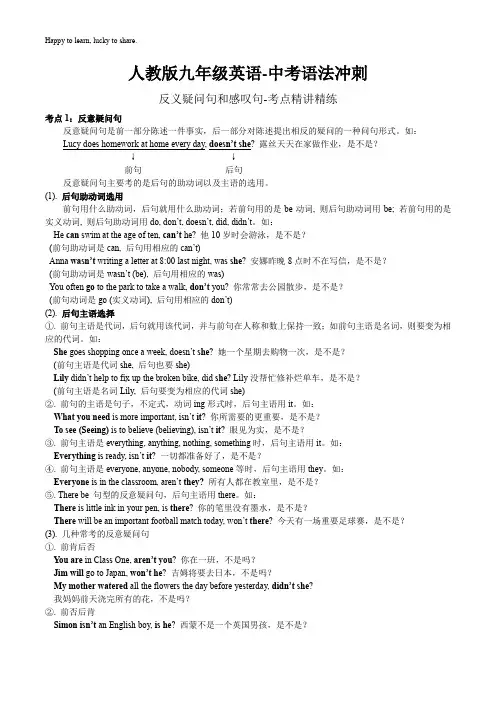
人教版九年级英语-中考语法冲刺反义疑问句和感叹句-考点精讲精练考点1:反意疑问句反意疑问句是前一部分陈述一件事实,后一部分对陈述提出相反的疑问的一种问句形式。
如:Lucy does homework at home every day, doesn’t she? 露丝天天在家做作业,是不是?↓↓前句后句反意疑问句主要考的是后句的助动词以及主语的选用。
(1). 后句助动词选用前句用什么助动词,后句就用什么助动词;若前句用的是be动词, 则后句助动词用be; 若前句用的是实义动词, 则后句助动词用do, don’t, doesn’t, did, didn’t。
如:He can swim at the age of ten, can’t he? 他10岁时会游泳,是不是?(前句助动词是can, 后句用相应的can’t)Anna wasn’t writing a letter at 8:00 last night, was she? 安娜昨晚8点时不在写信,是不是?(前句助动词是wasn’t (be), 后句用相应的was)You often go to the park to take a walk, don’t you? 你常常去公园散步,是不是?(前句动词是go (实义动词), 后句用相应的don’t)(2). 后句主语选择①. 前句主语是代词,后句就用该代词,并与前句在人称和数上保持一致;如前句主语是名词,则要变为相应的代词。
如:She goes shopping once a week, doesn’t she? 她一个星期去购物一次,是不是?(前句主语是代词she, 后句也要she)Lily didn’t help to fix up the broken bike, did she? Lily没帮忙修补烂单车,是不是?(前句主语是名词Lily, 后句要变为相应的代词she)②. 前句的主语是句子,不定式,动词ing形式时,后句主语用it。
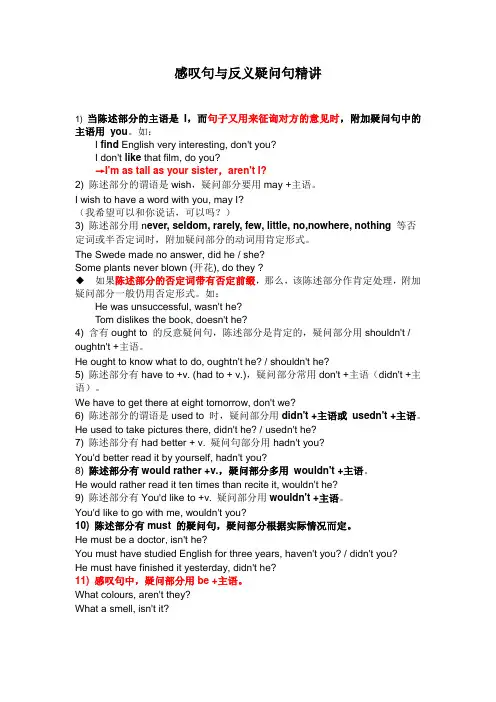
感叹句与反义疑问句精讲1) 当陈述部分的主语是I,而句子又用来征询对方的意见时,附加疑问句中的主语用you。
如:I find English very interesting, don't you?I don't like that film, do you?→I'm as tall as your sister,aren't I?2) 陈述部分的谓语是wish,疑问部分要用may +主语。
I wish to have a word with you, may I?(我希望可以和你说话,可以吗?)3) 陈述部分用n ever, seldom, rarely, few, little, no,nowhere, nothing等否定词或半否定词时,附加疑问部分的动词用肯定形式。
The Swede made no answer, did he / she?Some plants never blown (开花), do they ?◆如果陈述部分的否定词带有否定前缀,那么,该陈述部分作肯定处理,附加疑问部分一般仍用否定形式。
如:He was unsuccessful, wasn't he?Tom dislikes the book, doesn't he?4) 含有ought to 的反意疑问句,陈述部分是肯定的,疑问部分用shouldn't / oughtn't +主语。
He ought to know what to do, oughtn't he? / shouldn't he?5) 陈述部分有have to +v. (had to + v.),疑问部分常用don't +主语(didn't +主语)。
We have to get there at eight tomorrow, don't we?6) 陈述部分的谓语是used to 时,疑问部分用didn't +主语或usedn't +主语。

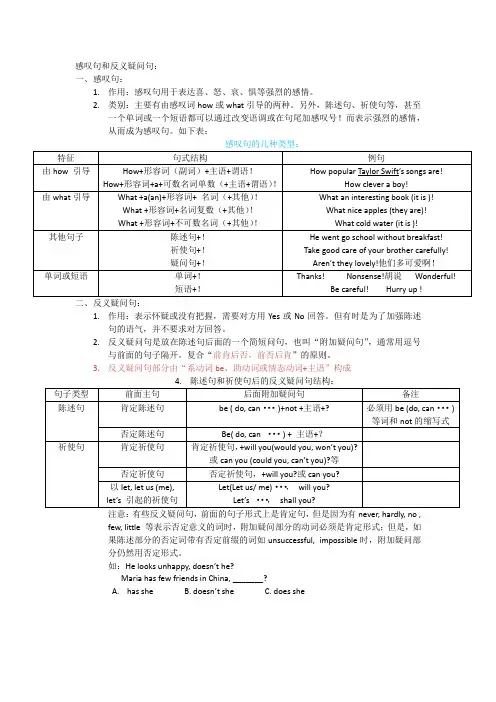
感叹句和反义疑问句:
一、感叹句:
1.作用:感叹句用于表达喜、怒、哀、惧等强烈的感情。
2.类别:主要有由感叹词how或what引导的两种。
另外,陈述句、祈使句等,甚至
一个单词或一个短语都可以通过改变语调或在句尾加感叹号!而表示强烈的感情,从而成为感叹句。
如下表:
1.作用:表示怀疑或没有把握,需要对方用Yes或No回答。
但有时是为了加强陈述
句的语气,并不要求对方回答。
2.反义疑问句是放在陈述句后面的一个简短问句,也叫“附加疑问句”,通常用逗号
与前面的句子隔开。
复合“前肯后否,前否后肯”的原则。
3.反义疑问句部分由“系动词be、助动词或情态动词+主语”构成
注意:有些反义疑问句,前面的句子形式上是肯定句,但是因为有never, hardly, no ,
few, little 等表示否定意义的词时,附加疑问部分的动词必须是肯定形式;但是,如
果陈述部分的否定词带有否定前缀的词如unsuccessful, impossible时,附加疑问部
分仍然用否定形式。
如:He looks unhappy, doesn’t he?
Maria has few friends in China, _______?
A.has she
B. doesn’t she
C. does she。
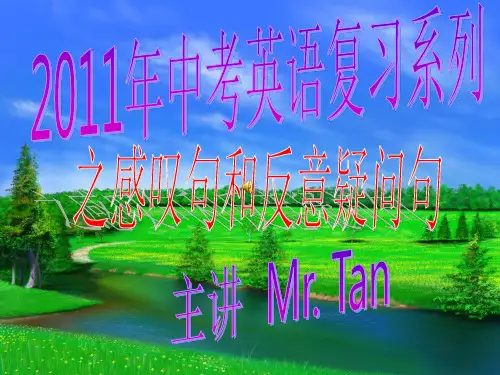
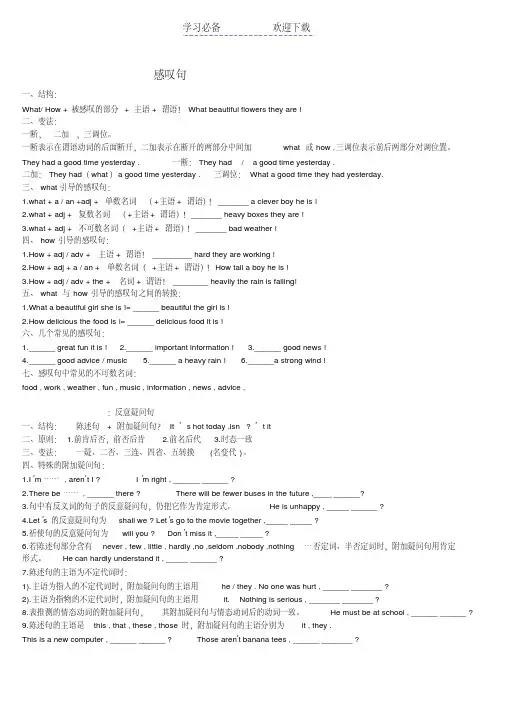
感叹句一、结构:What/ How +被感叹的部分+ 主语+ 谓语!What beautiful flowers they are !二、变法:一断,二加,三调位。
一断表示在谓语动词的后面断开,二加表示在断开的两部分中间加what 或how ,三调位表示前后两部分对调位置。
They had a good time yesterday . 一断:They had / a good time yesterday .二加:They had(what)a good time yesterday . 三调位:What a good time they had yesterday.三、what引导的感叹句:1.what + a / an +adj + 单数名词(+主语+ 谓语)!_______ a clever boy he is !2.what + adj + 复数名词(+主语+ 谓语)!_______ heavy boxes they are !3.what + adj + 不可数名词(+主语+ 谓语)!_______ bad weather !四、how引导的感叹句:1.How + adj / adv + 主语+ 谓语!_________ hard they are working !2.How + adj + a / an + 单数名词(+主语+ 谓语)!How tall a boy he is !3.How + adj / adv + the + 名词+ 谓语!________ heavily the rain is falling!五、what 与how引导的感叹句之间的转换:1.What a beautiful girl she is != ______ beautiful the girl is !2.How delicious the food is != ______ delicious food it is !六、几个常见的感叹句:1.______ great fun it is !2.______ important information !3.______ good news !4.______ good advice / music5.______ a heavy rain !6.______a strong wind !七、感叹句中常见的不可数名词:food , work , weather , fun , music , information , news , advice ,:反意疑问句?一、结构:陈述句+ 附加疑问句?It’s hot today ,isn’t it二、原则: 1.前肯后否,前否后肯 2.前名后代 3.时态一致三、变法:一疑、二否、三连、四省、五转换(名变代)。
广州卓越教育机构一对一初三英语语法---感叹句&反义疑问句感叹句感叹句通常有what, how引导,表示赞美、惊叹、喜悦、等感情。
what修饰名词,how 修饰形容词,副词或动词,感叹句结构主要有以下几种。
感叹句通常由what或how引导,一般各有三种情况:1.What引导的感叹句1)What+a(an)+形容词+可数名词的单数形式+主语+谓语!如:What a new watch it is! 多么新的一块手表啊!2)What+形容词+可数名词的复数形式+主语+谓语!如:What interesting books the children are reading!孩子们读的书多么有趣啊!3)What+形容词+不可数名词+主语+谓语!如:What important news it is! 多重要的新闻啊!2.How引导的感叹句1)How+形容词或副词+主语+谓语!如:How tall the girl is! 那个女孩多高啊!2)How+形容词+a(an)+可数名词的单数形式+主语+谓语!如:How heavy a box they are carrying! 他们抬的箱子多重啊!3)How+主语+谓语!如:How time flies!时间过得多快!特别提示:如何判断用what还是用how?方法一:凡是有a, an开头的,多用what!方法二:凡是形容词直接加名词多用what!方法三:其他一般用how。
感叹句的结构及特点总结感叹句并不难,how或what置句首。
名词之前用what,How后形副紧相连。
主谓次序不能变,口语省略倒常见。
二、把陈述句改为感叹句口诀陈改感叹并不难:What或How置句前,形、副紧跟how后,what(冠)要和形名连,主语谓语在句末,它们省略也常见。
三、感叹句解题四部曲(1)找谓语:先找谓语后定主语。
感叹句谓语动词或系动词位于句末,如果找不到就是省略了。
如:what a brave boy he is! How hard she studied!(2) 找主语:谓语动词前的名词或代词就是句子的主语,找到主语后,在主语前划线,把它与前面分离。
感叹句、反义疑问句及情景交际一. 感叹句感叹句用于表示喜悦、惊讶和气愤等情绪,带有强烈的感情色彩。
感叹句有两种:1、What+名词(或词组)这类句子结构常为:What(a/an)+形容词+名词+主语+谓语!主语谓语常在口语中省略。
What a fine day it is!What a pretty girl you have!2、How+形容词或副词这类句子结构常为:How+形/副词+名词+谓语!主语谓语有时也被省略。
How clever your son is!How beautiful your car is!How tall you have grown!How well he dances!How还可以修饰动词,表示强烈感情。
How I want to be a pilot!How she was astonished at his words.How they are amused at the performance!注意:what和how引导的两种感叹句,在口语中常把后一部分即陈述部分省略。
How fast! How crowded! What heavy traffic! What an honest man!区别:感叹句与特殊问句的区别感叹句之后为陈述语序,而特殊问句的语序要颠倒成为疑问语序。
感叹句:How far it is! (陈述语序)真远啊!特殊问句:How far is it? (疑问语序)有多远?感叹句:How busy you are! (陈述语序)你多么忙啊!特殊问句:How busy are you?(疑问语序)你有多忙?3、特殊结构的感叹句(1)that引导的从句(常省略主句),表示愿望、感叹:That he should do such a thing! 真想不到他竟会干出这种事情来!Oh, that I should live to see this. 真没想到我会碰上这样的事。
用心付出,用实力成就梦想!电话223090331一、How long 与How soon的用法1、how soon用来询问“过多久”动作才发生,谓语动词常为终止性动词,时态多为将来时,答语通常为“in + 一段时间”。
例如:how long have you been there? I have been there for 3 years.2、how long主要用来提问动作延续了多长时间,答语通常用“for + 一段时间”、“since + 时间点”或since引导的时间状语从句。
问句和答语中的谓语动词通常为延续性动词。
例如:-How soon will you arrive here? -I will arrive here in 3 hours.二、反义疑问句:1.陈述部分是I am 或I’m 时,疑问部分用aren’t I2.陈述部分有no ,nothing, nobody, no one, never, hardly, few, little时,疑问部分用肯定4.陈述部分主语是there, this, that , these, those时,疑问部分用there , it ,they5.陈述部分主语是everyone, everybody, someone, somebody, anybody, no one, nobody等时,疑问部分用they, he;陈述部分是everything, something, nothing, anything时,疑问部分用it6.祈使句的反意疑问句用will you, 或shall we 一般Let's go!用shall we 其他的用will you以Let's 开头的祈使句,附加部分用shall we, 以Let us 开头的,附加部分用will you 这个可以这样记忆:let's合二为一,关系近的当然是我们we了,分开的话就要分你我了,所以就是you了7.宾语从句中,以主句为准,但如果主语是第一人称且谓语动词是think, believe, guess, suppose时,以从句为准三、.感叹句:用法:去掉主谓部分,中心语是形容词或副词的用how;中心语是名词的用what.__what___ a bright boy he is! ___how __ bright the boy is!_what____ good apples they are! ___how__ good the apples are!注:有时主谓部分可省略注:若句中无形容词、副词,只有一个主谓部分,则感叹词用:例如:___how___I want to be a great teacher!___how ___ time flies!7. We have a good time.How good a time we haveWhat a good time we have语法复习感叹句表示说话人强烈的语气,其构成有以下几种:1、What +a/an +形容词+名词+主谓结构肯定句!eg: What a good boy he is!2、What +形容词+名词+主谓结构肯定句!eg: What good news it is !(在口语中经常省略主谓结构肯定句)3、How +主谓结构肯定句!eg: How I miss you !4、How+形容词/副词+主谓结构肯定句!eg: How lovely the boy is!5、How + 形容词+a/an +名词+主谓结构肯定句!eg: How fine a voice he has!句子的结构:说明: 此结构由“主语+及物的谓语动词+宾语+宾语补足语”构成。
反意疑问句与感叹句反意疑问句1)反义疑问句由两部分组成:前一部分是一个陈述句,后一部分是一个简短的疑问句,两部分的人称时态应保持一致。
可记为:前肯后否;前否后肯.2)陈述部分含have时①He has supper at home every day, doesn’t he? (不能用hasn’t he?)②They have known the matter, haven’t they? (不能用don’t they?)③She has a nice pen, doesn’t she?3) 陈述部分含有否定词:few, little, rarely, hardly, never, seldom, no,nothing, nowhere, nobody等,疑问部分要用肯定。
He has never been to Beijing, has he? (不用wasn’t he?)4) 陈述部分为祈使句(含肯定否定)疑问部分用will you,但陈述部分为Let’s……时,问句部分习惯上用shall we?形式。
Let me have a try, will you?Let us stop to rest, will you?Let’s go home together, sha ll we?5) 宾语从句①I think that he has done his best, hasn’t he?②We don’t believe that the news is true, is it? (不用do we?)②He didn’t think that the news was true, did he? (不用wasn’t/ was it?)6) 陈述部分的主语为不定代词:① Someone has taken the seat, hasn’t he?②Everyone has done their best in the game, haven’t they?①Something is wrong with the computer, isn’t it?② Nothing has happened to them, has it?7) 陈述部分为I am (I’m),疑问部分用aren’t I.I am silly, aren’t I? I’m no t silly, am I?8) 陈述部分为There (Here) + be + 主语时,问句部分用动词+there(here)?形式。
如:①There are two cakes on the plate, aren’t there?②Here is a story about Mark Twain, isn’t here?③There are three boys in the room, aren’t there?9) 感叹句。
感叹句后加反意疑问句时,其反意疑问句需用be的一般现在时态的否定形式。
例如:What fine weather, isn't it? 多好的天气啊,是吧?10) 当陈述部分谓语动词是need, dare, used to,且这些词被用作实义动词时,其反意疑问句需用do的适当形式。
若daren’t 和needn’t为情态动词,疑问部分用dare 或need构成。
例如:We need to help them, don’t we?You daren’t go there, dare you?11) 陈述部分的主语是指示代词this或that时,反意疑问句的主语用it,当陈述部分的主语是指示代词these或those时,其反意疑问句的主语用they。
例如:This is a plane, isn't it? 这是一架飞机,是吗?These are grapes,aren't they? 这些是葡萄,是吗?12) 当陈述部分主语是从句、不定式(短语)、动词-ing形式时,反意疑问句的主语应该用it。
例如:What you need is more important, isn't it?你需要的东西更重要,是吧?13) 陈述部分有had better时,反意疑问句中要用hadn't。
例如:We had better go to school at once, hadn't we? 我们现在最好马上去上学,好吗?14) 陈述部分有would rather +v.,疑问部分多用 wouldn't +主语。
He would rather read it ten times than recite it, wouldn't he? 15) 陈述部分有You'd like to +v. 疑问部分用wouldn't +主语。
You'd like to go with me, wouldn't you?反意疑问句练习题1、The poor man needs our help, ______ he?A. needB. needn’tC. doesD. doesn’t2、He’s never watched such an important watch, ______?A. hasn’t heB. has heC. isn’t heD. is he3、You have few friends, ______?A. haven’t youB. have youC. you haveD. you haven’t4、Tom has supper at school, ______?A. hasn’t heB. has heC. doesn’tD. does he5、He’s almost finished ______ the book, ______ he?A. reading, isn’tB. to read, isn’tC. reading, hasn’tD. to read, hasn’t6、You were on the farm yesterday, ______ you?A. didn’tB. don’tC. can’tD. weren’t7、Don’t close the window, ______ you?A. didB. willC. wasD. won’t8、Let’s go shopping, ______ we?A. shallB. willC. wasD. is9、Joan’s late for school,______?A. wasn’t sheB. hasn’t sheC. isn’t sheD. doesn’t she10、The meeting will begin at half past two in the afternoon, ______.A. does itB. doesn’t itC. will itD. won’t it11、The sick man’s allowed to take a walk in the garden every day, ______?A. is heB. isn’t heC. has heD. hasn’t he12、There are few people on the playground, ______?A. are thereB. are theyC. has heD. hasn’t he13、Tom could hardly work out the maths problem, ______ he?A. couldn’tB. couldC. didn’tD. did14、Let’s go to the island, ______?A. won’t youB. will youC. shall weD. will we15、Don’t forget to give Polly some food and change he water, ______?A. will youB. shall weC. won’t youD. do you16、There are few people on that village, ______ there?A. didB. doesC. wasD. are17、She is too young to go to school, ______ she?A. didn’tB. doesC. wasn’tD. is18、John had to join a long queue to get a ticket, ______?A. did heB. didn’t heC. had heD. hadn’t he19、--Your blouse is yellow, isn’t it? --______.A. Yes, it is.B. It's red.C. I'm not sure.D.I don’t know.20、You have met before, ______?A. haven’t youB. have youC. do youD. don’t you21、Allen has never been to Beijing, ______?A. has sheB. hasn’t sheC. has AllenD. hasn’t he感叹句感叹句是用来表达说话者说话时的惊异、喜悦、愤怒、气愤等思想感情的句子。
其结构常由感叹词“What(How)+感叹的部分+主语+谓语!”构成。
读时一般用降调。
主要有以下两大句型:(一)由感叹词what引导的感叹句。
what修饰名词或名词短语,有以下两种形式:1. What+a(an)+(形容词)+单数可数名词+主语+谓语!如:What an apple this is!What a fine day it is!2. What+(形容词)+可数名词复数或不可数名词+主语+谓语!What kind women they are!What nice music it is!(二)由How引导的感叹句。
how用来修饰形容词、副词或动词。
其结构是:How+形容词(副词)+主语+谓语!How hard the worker are working!How clever the girl is!How quickly the boy is writing!注意:当how修饰动词时,动词不跟着感叹词提到主语之前。
How the runner runs!(三)what与how引导的感叹句,一般情况下可以相互转换,转换后意义不变。